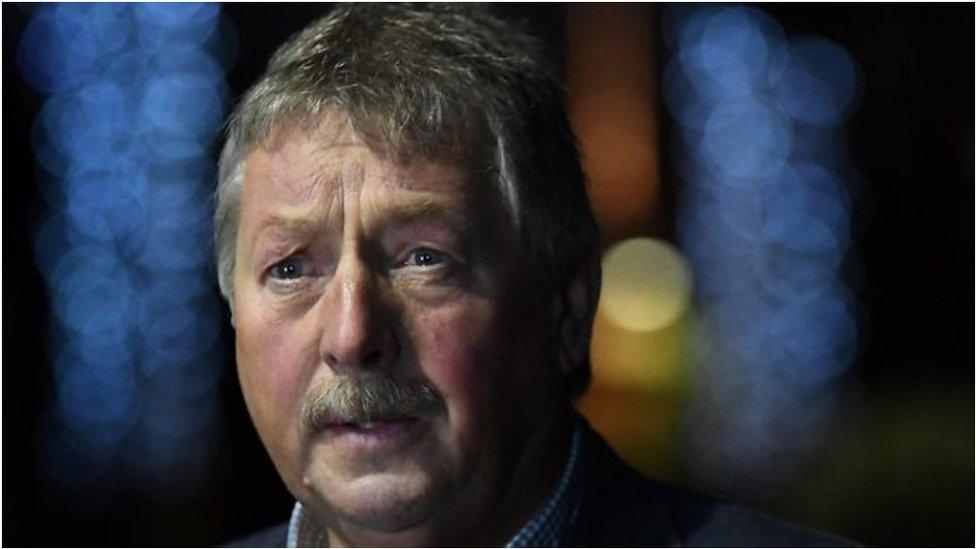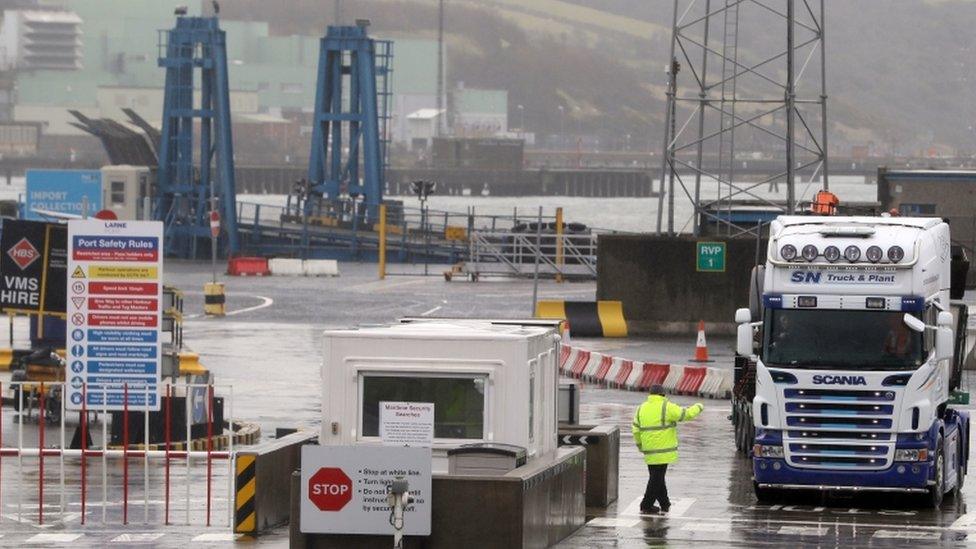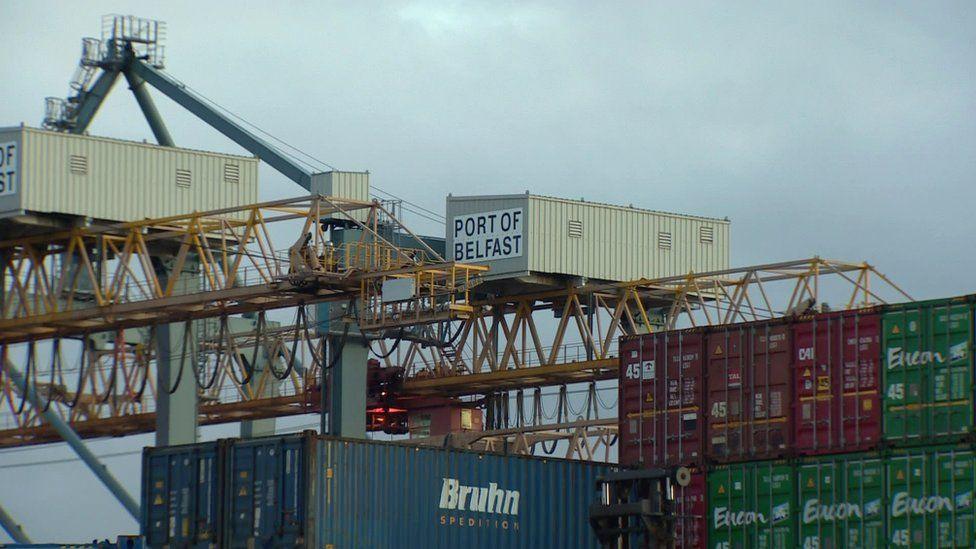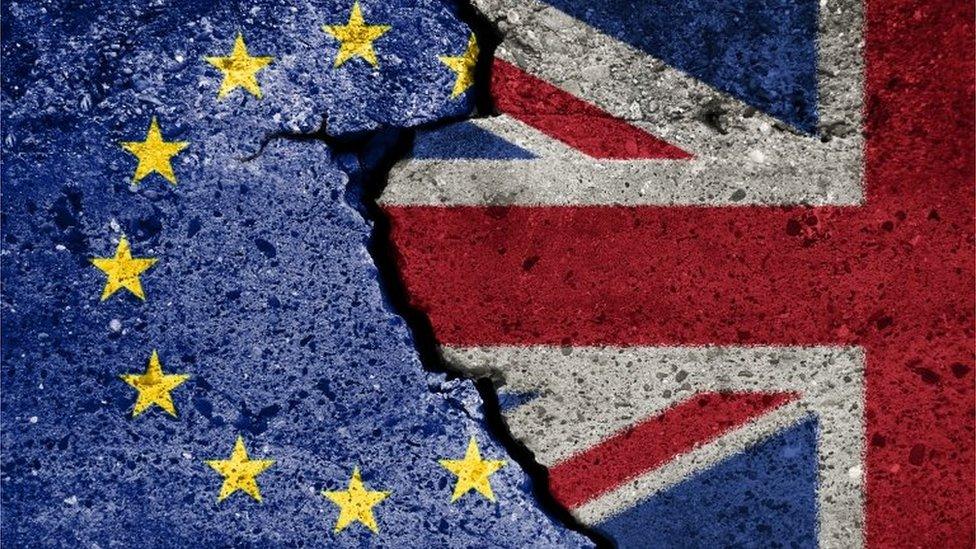Brexit: DUP says it will fight against protocol with every means
- Published

The DUP will fight to oppose the NI Protocol "with every means we have", Sammy Wilson has said.
The East Antrim MP defended a decision by DUP Agriculture Minister Gordon Lyons to halt work on new permanent post-Brexit border control posts.
Other Stormont parties have said Mr Lyons did not have the authority to take such action.
The DUP has argued that it is responding to trade difficulties caused by the protocol.

Gordon Lyons temporarily replaced Edwin Poots as agriculture minister in February
Border Control Posts (BCPs) are used to check food products from GB and are a requirement of the Brexit deal between the UK and EU.
Existing temporary BCPs are continuing to operate.
Unionists oppose the post-Brexit arrangements for Northern Ireland, which have effectively created a trade border in the Irish Sea.
The Stormont Executive met on Monday morning and discussed Mr Lyons's decision.
It is understood he will consult Northern Ireland's Attorney General for further legal advice and bring details to Tuesday's executive meeting.
His predecessor Edwin Poots previously sought legal guidance about whether he could instruct officials not to operate the BCPs, but he was advised this would be unlawful.

Speaking on BBC Radio Ulster's Talkback programme on Monday, Mr Wilson said if his party did not try to undo the protocol, many businesses in Northern Ireland would struggle.
"If that means we have to use the tactics that Gordon (Lyons) has at the weekend, as Arlene (Foster) has outlined, we will seek to use every opportunity to attack the protocol, its implications, to make sure it is destroyed," he said.
"In the longer run it's going to destroy democracy because the protocol enforces laws on NI that are not enforced on the rest of the United Kingdom.
"When opportunities arise we will make sure we take those opportunities to undermine the protocol and to seek to change the government's mind in its implementation."
EU 'expects UK commitment'
The European Commission said it had been reassured that "relevant checks" were continuing as usual.
However, spokesperson Daniel Ferrie said the UK was required to complete the permanent facilities at NI's ports by mid-2021.
"We expect the same commitment when it comes to the UK's obligations to the protocol regarding permanent facilities that need to be put in place by the middle of this year... in line with the protocol and also in line with joint committee decisions of December," he said.
Mr Ferrie said the UK and EU had a "shared responsibility" to make the protocol work for everyone in Northern Ireland and that's what they were committed to doing.
Facing assembly members (MLAs) at Stormont on Monday afternoon about the issue, Mr Lyons said his decision had been "entirely appropriate and reasonable".
Meanwhile, the senior official in charge of delivering border checks under the Northern Ireland Protocol is scheduled to give evidence to MLAs later this week.
'Stop playing games'
Denis McMahon, the permanent secretary in the Department of Agriculture, Environment and Rural Affairs (DAERA), will appear before a Stormont scrutiny committee on Thursday.
It follows a call from the chair of the committee, Sinn Féin's Declan McAleer, for Mr McMahon to brief politicians in the wake of the minister's decision stop work on permanent border control posts.
It is understood Northern Ireland's Chief Vet Robert Huey and another senior official in charge of Brexit contingency management will also appear before the committee.
On Sunday, Chris Hazzard said the DUP had "walked off the pitch" and need to "stop playing games".
The situation is "deeply, deeply regrettable", he added.
While Infrastructure Minister Nichola Mallon described Mr Lyons's decision as "irresponsible".

What is the NI Protocol?
The Northern Ireland Protocol is part of the Brexit deal which prevents a hardening of the land border between Northern Ireland and the Republic of Ireland.
It does that by keeping Northern Ireland in the EU single market for goods.
That has created a new trade border with Northern Ireland and the rest of the UK.
Unionists oppose the protocol, arguing that it has damaged internal trade from GB to NI and poses a risk to the future of the UK union.
But anti-Brexit parties in NI say that it must be implemented in full, and that issues should be worked out through joint UK-EU processes.

- Published28 February 2021

- Published27 February 2021

- Published2 February 2024

- Published22 February 2021
